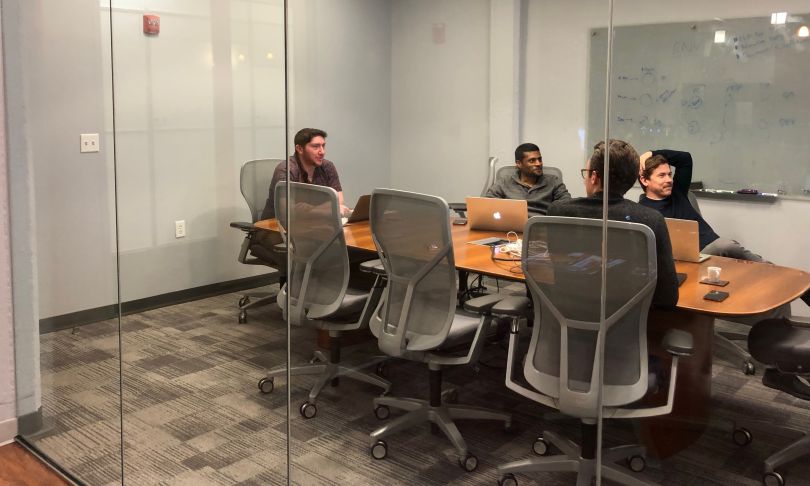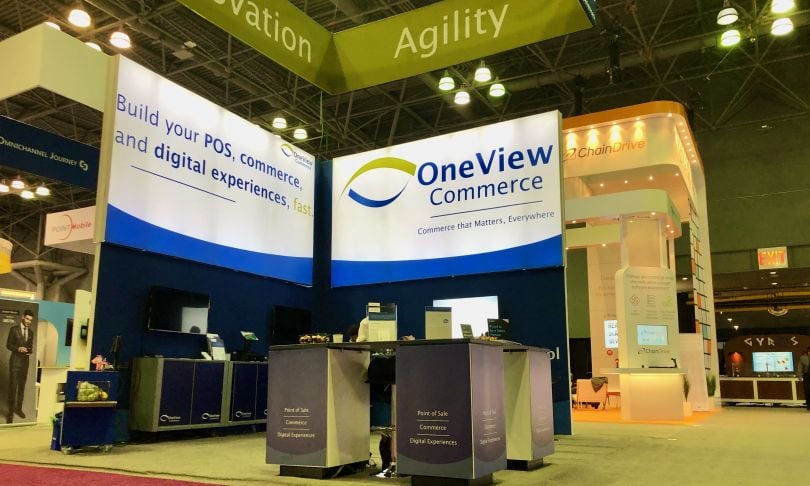As the first wave of Covid-19 swept through the country and the world in 2020, OneView Commerce team members were pulled from their bustling Seaport office to their homes, interacting only from behind computer screens.
Amid the sudden shift in workplace dynamics, leaders faced a daunting task: keeping their people-first culture, built on connection, strong in a remote environment.
To do so required an all-hands-on-deck approach and a revamped company culture program that consisted of intentional CEO Coffee Chats, virtual team building activities, holiday wine and cheese tasting, remote office hours for employees and other virtual engagement events.
Since then, OneView’s focus on maintaining its people-first culture hasn’t let up, and opportunities to strengthen bonds, recognize team members’ accomplishments and even band together every month for local nonprofits are more present than ever before.
“Our people focus has only gotten stronger,” said Strategic Account Manager Bryan Glick. “Our consistent push for adding in-person get-togethers has been great and provides an opportunity to feel close with our coworkers, making more than just a simple work connection.”
Prioritizing people doesn’t always come naturally in the workplace. Job titles and responsibilities can eclipse the person to which they are attached. But when the whole person is valued — not just their contributions to broader business objectives — a company can genuinely put its people first.
“I had a family emergency a few years ago, and the entire company rallied around me stronger than I could’ve imagined with donations and unending support. Because they went ‘the extra mile,’ I will always trust and respect the people around me here at OneView,” said Glick.
“Because they went the ‘extra mile’ [when I needed support], I will always trust and respect the people around me here at OneView.”
Going the extra mile is a common theme in both the professional and the personal lives of OneView team members.
Likewise, creating a satisfying employee experience hinges upon ensuring colleagues can attain their goals — even if those goals fall outside of their current positions.
“We have had team members who showed interest in other areas in the company that would fit their strengths and allow them to serve the company better. Both times, training programs were created by both the supervisor gaining the employee and the one they were leaving,” said Senior Director of Global IT Operations Tanner VanEssen.
“Employees who are happier in their work tend to produce better products,” he noted while explaining why supporting these ambitions was worthwhile. “Every company’s core asset is the people they employ. Being a people-first company is a win-win for both employee and employer.”
Another common refrain among OneView team members is the benefits of encouraging openness and transparency.
How can team members reach their goals if they don’t feel comfortable sharing what they are? How can someone be fully present for important matters in their personal life if nonnegotiable demands and expectations restrict them? How can lasting connections form if authenticity isn’t encouraged?
At OneView, the overarching answer to these questions is simple: Listen to team members and empower them to drive the conversation and create the change.
“Our company has an amazing commitment to encouraging all employees to have a voice and actively works to improve employee happiness through that feedback,” said Agile Manager Jen Fowler. “Happy, valued, empowered and fulfilled employees are committed to their fellow employees, the work they do, the products they create and, ultimately, the company’s success.”
Built In sat down with Glick, VanEssen and Fowler to learn more about OneView’s approach to keeping its culture people-first.
What’s one thing that focuses your company culture on the employee experience?
VanEssen: Open communications at all levels. We give regular and transparent feedback, allowing employees time to self-train on things they want to do to advance their careers and the company, which gives employees more sense of value that they have control over their careers and shows the company cares about them.
Fowler: The combination of our regular employee net promoter score surveys and our culture committee make up the core of our employee-focused culture. We have great transparency as the results of the eNPS surveys, which are always shared across the company, shows. Our culture committee works to address the feedback from those surveys and implement improvements.

Tell us about a moment when one of your leaders ‘walked the talk,’ demonstrating a true commitment to culture.
Glick: Our employees all operate on significantly differing working schedules. This posed a lot of ongoing frustration for specific areas, with certain positions being out of the office for regional holidays.
While most CEOs, or leaders in general, would leave this to managers, our CEO made it a point to partner with the Culture Committee in having general discussions and one-on-ones with employees about this frustration. As a result of these conversations, a recommendation for an improved holiday calendar was put forth by the Culture Committee, and our CEO and executive team were eager to implement an improved schedule. This example exhibits our leaders’ commitment to the people-first culture at OneView.
VanEssen: In addition to the improved holiday schedule, the executive team also implemented a week-long winter break at the end of the calendar year.

Was the culture at your company built deliberately or did it happen organically?
Fowler: I think it’s probably a little of both. I think you have to have a commitment to a strong culture and prove that you actively support and encourage it. Once you have that, I think it grows organically, especially when you have transparency across the company and a team committed to constant improvement.
Glick: The organic side of our culture has been around ever since I’ve been here. I’ve also seen and been a part of a lot of deliberate culture growth throughout the organization. It has always felt more like a second family than just some job to clock in and out at. One of the core identities that OneView has embodied is that sense of value for each and every member of our team.
Regardless of your position or tenure, you are important here, and people let you know it.








